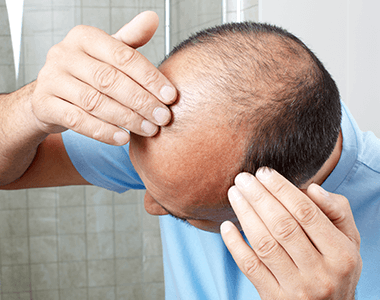General Hair Loss
What is hair thinning, hair loss and baldness?
Thinning of the hair and hair loss can appear in many different ways. Thinning hair can be a gradual loss of hair and hair density over all or part of the scalp. Or it may be thinning of the hair shafts themselves, so the hair feels thinner, less strong and healthy. Hair loss might happen gradually and follow a predictable pattern, or it may be sudden and dramatic. There may be hair lost in one area or in several patches, or in extreme cases over the entire head, resulting in complete baldness.

What causes it?
There can be many causes of hair thinning and hair loss, ranging from a natural, inherited tendency to hair loss with age, to stress and pregnancy, to contact with harmful chemicals, through to autoimmune disease. For example, in Male Pattern Hair Loss (MPHL) the presence of the enzyme 5-alpha reductase in hair follicles, increases the levels of dihydrotestosterone (DHT) and shrinks the hair follicle, to the point that it becomes unable to support normal hair growth.
A very different example is anagen effluvium, where the most active period in the hair growth cycle is affected, most commonly by anti-cancer drugs.
These drugs target fast growing cells, desirably the cancer cells themselves, but less desirably, other fast growing cells such as red blood cells and hair cells are also affected. This causes dramatic hair loss on the head and often loss on other parts of the body
Particularly where hair loss is sudden, it’s important for the sufferer to take medical advice so that an accurate diagnosis can be made and appropriate treatment and advice given.
Women may also lose their hair through a condition called telogen effluvium. This occurs when the normal hair growth pattern is disrupted and there is excess shedding of hair, resulting in loss of density of the hair over the scalp.
Treatment
Treatment for hair thinning and loss will entirely depend on the cause of the condition. For example, in MPHL the drug minoxidil can help stimulate the blood supply to the follicle and so assist growth. Minoxidil is only effective while it is being taken.
In telogen effluvium, the advice given is usually to be patient because once the cause of the condition has subsided, the hair will usually regrow normally.
Why see a trichologist?
A trichologist will examine the hair and scalp, and give an opinion on the causes of the hair loss, together with advice on what the options for treatment are. In severe cases the trichologist will advise referral first to a GP, if that has not already been done, and advise on referral to a dermatologist.
Any kind of hair loss, particularly in women, can have a devastating psychological impact. In all cases, the trichologist will be able to give knowledgeable and trusted reassurance and advice.
FAQ's
[otw-bm-list id=”25″]
Case Studies
[otw-bm-list id=”26″]